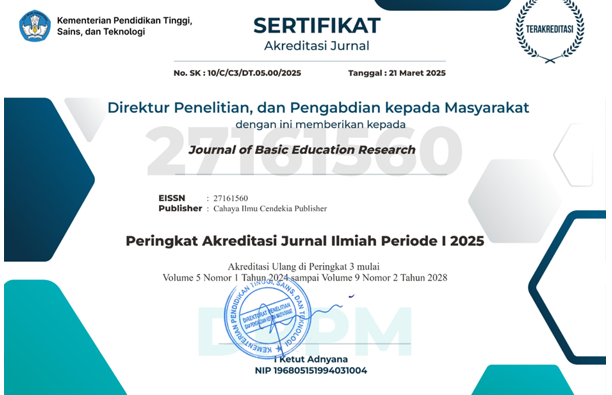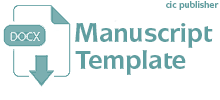Application of Canva Media in Entrepreneurship Project to Strengthen Pancasila Student Profile
Abstract
Purpose of the study: This study aims to evaluate the effectiveness of Canva as a digital design medium in the implementation of the Pancasila Student Profile Strengthening Project (P5) with an entrepreneurship theme in elementary education.
Methodology: The research investigates how Canva facilitates students' character development, particularly in creativity, independence, collaboration, and critical thinking. Employing a descriptive qualitative approach within a case study design, the study involved classroom observations, in-depth interviews with school stakeholders, and documentation analysis of student work. Data triangulation and thematic narrative analysis were used to ensure validity and richness of interpretation.
Main Findings: The findings indicate that Canva significantly enhances students' engagement and character formation, supporting active, collaborative, and visually expressive learning. Teachers observed improved student autonomy and creativity, while students expressed pride and satisfaction in their work. Despite challenges such as limited device access and uneven digital literacy, adaptive strategies enabled inclusive participation.
Novelty/Originality of this study: The originality of this study lies in integrating a graphic design-based platform into project-based character education aligned with the Pancasila Profile framework. The results contribute to empirical insights on innovative and culturally grounded digital learning practices for primary education in the 21st century.
References
A. Farihah and T. Churahman, “Education management as a tool for student character building: a sociology of education perspective,” Eur. J. Learn. Hist. Soc. Sci., 2024, doi: 10.61796/ejlhss.v1i8.804.
H. Marhadi, “Cognitive abilities, student character, and teacher self-evaluation competencies through character education programs,” JPI J. Pendidik. Indones., 2024, doi: 10.23887/jpiundiksha.v13i4.80069.
P. L. Wairisal, I. K. Sukarma, M. I. Pamungkas, E. Harefa, L. Husnita, and R. Nazmi, “Teachers moral education and social competence: their influence on student character formation at madrasah aliyah negeri in Padang,” J. Ecohumanism, 2025, doi: 10.62754/joe.v4i1.6462.
E. Utaminingsih, A. Ihsandi, and I. S. Mutiarawati, “Pancasila philosophy as the basis of education and national character,” J. Ilm. Profesi Pendidik., 2023, doi: 10.29303/jipp.v8i4.1752.
T. Za, W. Walidin, S. Idris, and M. Huda, “Pancasila sebagai Nilai Inti Pembinaan Karakter di Perguruan Tinggi Islam,” J. Ilm. Peuradeun, 2024, doi: 10.26811/peuradeun.v12i2.1212.
I. G. Astawan, D. N. Sudana, N. Kusmariyatni, and I. G. N. Japa, “The STEAM integrated panca pramana model in learning elementary school science in the industrial revolution era 4.0,” Int. J. Innov. Creat. Change, vol. 5, no. 5, pp. 26–39, 2019.
D. U. dan A. R. Afendi, “Implementasi profil siswa pancasila pada pendidikan sekolah dasar dengan pendekatan project-based learning,” EduLine J. Pendidik. Dan Inov. Pembelajaran, 2022, doi: 10.35877/454ri.eduline1280.
F. Firdiansyah, L. Apriana, and E. Emilia, “Upaya pelaksanaan proyek penguatan profil mahasiswa pancasila sebagai karakter mahasiswa,” J. Inov. Media Pembelajaran Dan Media Pembelajaran, 2023, doi: 10.52690/jitim.v3i2.711.
R. H. Sagita, P. Z. Ferryka, and I. Rahmawati, “Project-based learning in science-social education as an effort to implement pancasila student profiles in sd mpk bayat,” J. Pendidik. Sekol. Dasar, 2023, doi: 10.30870/jpsd.v9i2.21290.
A. Cahayani, “The role of entrepreneurial spirit in indonesian youths and housewives to reduce unemployment and poverty rate,” Socio-Econ. Dev., 2019, doi: 10.4018/978-1-5225-2008-5.CH009.
H. Suwarno, M. Malinda, Y. Margaretha, and C. Aliwinoto, “Reducing unemployment through enhancement entrepreneurship education, entrepreneurial orientation, entrepreneurial intention,” Integr. J. Bus. Econ., 2023, doi: 10.33019/ijbe.v7i3.743.
S. E. Fatimah and P. Suryana, “Mediation model of self-efficacy on student entrepreneurial interest,” Int. J. Innov. Technol. Econ., 2023, doi: 10.31435/rsglobal_ijite/30122023/8078.
F. Zulhandayani, “Canva sebagai media peningkatan kreativitas mendesain iklan slogan dan poster pada model project-based learning.,” MUKADIMAH J. Pendidik. Sej. Dan Ilmu-Ilmu Sos., 2023, doi: 10.30743/mkd.v7i1.6522.
W. Rahayu, I. Zutiasari, and S. Munadhiroh, “Learning media of canva based on flipbook in the subjects of creative products and entrepreneurship to improve students’ digital technopreneurship competence,” Proc. Sixth Padang Int. Conf. Econ. Educ. Econ. Bus. Manag. Account. Entrep. PICEEBA 2020, 2021, doi: 10.2991/aebmr.k.210616.033.
P. Gurning, E. T. Maasawet, Y. Hudiyono, L. Subagiyo, H. Herliani, and A. Akhmad, “Developing of canva-based learning media to increase student creativity and learning outcomes,” JPBI J. Pendidik. Biol. Indones., 2024, doi: 10.22219/jpbi.v10i3.33815.
N. Jamaludin and S. F. Sedek, “Canva as a digital tool for effective student learning experience,” J. Adv. Res. Comput. Appl., 2024, doi: 10.37934/arca.33.1.2233.
M. Noor and E. Karani, “The Effectiveness of Canva Application as a Media in Writing Greeting Card at the Eight Grade of SMP Negeri 12 Banjarmasin,” J. Educ., vol. 5, no. 3, pp. 9540–9548, Feb. 2023, doi: 10.31004/joe.v5i3.1826.
F. R. Pratama and M. H. Hikmat, “Improving student’s motivation and learning outcomes through canva in english learning at middle schools,” J. Engl. Lang. Teach. Linguist., 2024, doi: 10.21462/jeltl.v9i3.1381.
J. W. Creswell, “Research design: Qualitative, quantitative, and mixed methods approaches-4th ed,” SAGE Publ., vol. 86(385), 2013.
Sugiyono, Memahami Penelitian Kualitatif. Bandung: Alfabeta, 2005.
M. B. Miles, A. M. Huberman, and J. Saldana, Qualitative Data Analysis: A Methods Sourcebook, 4th ed. Sage Publications, 2020.
O. O. Adeleye, C. A. Eden, and I. S. Adeniyi, “Educational technology and the digital divide: A conceptual framework for technical literacy inclusion,” Int. J. Sci. Res. Arch., 2024, doi: 10.30574/ijsra.2024.12.1.0405.
R. A. Cabasan, “Effective technology integration: closing the digital gap among high school students,” J. Interdiscip. Perspect., 2024, doi: 10.69569/jip.2024.0295.
S. Park, “Access to digital devices and its relationship to digital media literacy,” pp. 241–250, 2011.
D. Ginting, D. Sabudu, Y. Barella, A. Madkur, R. Woods, and M. K. Sari, “Student-centered learning in the digital age: in-class adaptive instruction and best practices,” Int. J. Eval. Res. Educ. IJERE, 2024, doi: 10.11591/ijere.v13i3.27497.
B. C. Jose, M. A. Kumar, T. UdayaBanu, and M. Nagalakshmi, “Assessing the Effectiveness of Adaptive Learning Systems in K-12 Education,” Int. J. Adv. IT Res. Dev., 2024, doi: 10.69942/1920184/20240101/02.
T. T. Tursynova, K. Saginov, and S. Bakhisheva, “Application of adaptive learning technology in the educational process,” Bull. Kazakh Natl. Womens Teach. Train. Univ., 2023, doi: 10.52512/2306-5079-2023-94-2-98-112.
Y.-L. E. Liu, T.-P. Lee, and Y.-M. Huang, “Enhancing university students’ creative confidence, learning motivation, and team creative performance in design thinking using a digital visual collaborative environment,” Think. Ski. Creat., 2023, doi: 10.1016/j.tsc.2023.101388.
C. L. Weitze, “Designing pedagogical innovation for collaborating teacher teams,” J. Educ. Teach., vol. 43, pp. 361–373, 2017, doi: 10.1080/02607476.2017.1319511.
C.-W. Chen, “Design pedagogy for enhancing peer learning and creative thinking,” Des. Cult., vol. 16, pp. 131–143, 2024, doi: 10.1080/17547075.2024.2332820.
L. S. Vygotsky, Mind in Society: The Development of Higher Psychological Processes. Cambridge, MA: Harvard University Press, 1978.
D. J. C. Tindowen, J. Bassig, and J.-A. Cagurangan, “Twenty-first-century skills of alternative learning system learners,” SAGE Open, vol. 7, 2017, doi: 10.1177/2158244017726116.
Copyright (c) 2025 Angela Sirlanie, Kartika Christy Suryandari, Sukarno Sukarno

This work is licensed under a Creative Commons Attribution 4.0 International License.
Authors who publish with this journal agree to the following terms:
- Authors retain copyright and acknowledge that the Journal of Basic Education Research is the first publisher licensed under a Creative Commons Attribution 4.0 International License.
- Authors are able to enter into separate, additional contractual arrangements for the non-exclusive distribution of the journal's published version of the work (e.g., post it to an institutional repository or publish it in a book), with an acknowledgment of its initial publication in this journal.
- Authors are permitted and encouraged to post their work online (e.g., in institutional repositories or on their website) prior to and during the submission process, as it can lead to productive exchanges and earlier and greater citation of published work.





.png)


.png)
.png)


















